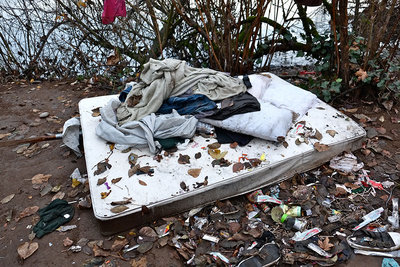An unusual idea to deal with trash along the Willamette River left by homeless campers is raising eyebrows and tempers, but the details are still being discussed and hashed out.
The concept is to recruit and train homeless individuals and provide them with attractive little huts, or “Hobbit houses” as Terry McDonald, executive director of St. Vincent de Paul calls them. Four to seven of these river stations would be placed along each side of the Willamette River between I-5 and the area north of Owosso Bridge, areas frequented by homeless campers as well as river walkers, cyclists and young people who like to party in secluded areas.
In related news, a river “ambassadors” pilot program was announced this week, using paid bicyclists to patrol the riverfront and report problems to the Eugene Police Department. It is not clear if the two proposals are related.
The Hobbit house “guardians” would be provided with portable toilets, garbage service, cell phones and a stipend paid through private fundraising. Their duties could include patrolling the riverfront, “asking illegal campers to vacate, enlisting volunteer help with cleaning up debris as needed, maintaining a log of daily findings and actions,” and reporting to a supervisor or committee, according to a draft project description by the Rev. Wayne Martin, one of founders of the Nightingale Health Sanctuary. The proposal was first aired publicly at a Eugene City Council meeting April 27 by John Brown, a longtime river advocate and EWEB commissioner.
“I think the general idea has a lot of merit,” says Richie Weinman, a member of the Eugene Human Rights Commission that will be discussing the idea this week. “There is some controversy about it (this is Eugene) if the crew is asked to report/ rat-out illegal campers. I’d like to think that there is common ground that can be found.”
Local email listservs dealing with homelessness are blasting the proposal. Critics worry that the project will further criminalize the homeless and create an adversarial relationship between the guardians and other homeless people. Concern has also been voiced about the plan not solving the fundamental reason people are camping by the river: They have nowhere else to go, particularly if they are using alcohol or drugs. Other comments suggest hiring people to patrol the riverfront with trash bags would be preferable.
“Safety and violence is a huge issue here,” says Alley Valkerie, longtime Eugene homeless advocate now living in Portland. “Anyone living in a hut on the riverbank whose job it is to rat out other homeless folks will be a target, plain and simple. Most homeless folks know that, which is why I think that most would never agree to such a proposal, but anyone foolish enough to agree will run into trouble very fast.”
Brown defends the draft proposal, saying, “Every plan has potential faults. I’d like to invite all of those who have these ideas to come along on a cleanup to see firsthand what the environmental damage is. Almost every camp I have encountered has needles and items that appear to have been stolen.”
Regarding the potential for adversity, Brown says, “All we are asking is for our river-keepers to inform them of our preference to have them camp at least 100 feet from the river. So far all of the unhoused people we have engaged like the idea and want to help.”
Homeless advocate Karl Eysenbach says the plan “falls on its face like a bad soufflé” and the huts will be expensive to build and maintain, at a time when charitable donations for existing homeless camps are already maxed out. He figures “any resident of a Hobbit house must be paid the equivalent of a full-time minimum wage job … the last time I checked, slave labor or being an indentured servant is against the law.”
“Ultimately,” says Eysenbach, “isn’t it a simpler solution to provide for monitoring of the river in a much more cost-effective way than this proposal?”
The Portland-based Willamette Riverkeeper (WK) is involved in cleanup projects along the Willamette but is not involved in the local proposal. Travis Williams, executive director of WK who also holds the title of Riverkeeper, says his nonprofit has volunteer “river guardians” who take boat trips down the Willamette from Portland to Eugene and “look for abandoned campsites, try to figure out who the landowners are and get them to clean up the sites.” WK also works with government agencies, other organizations and individuals, but does not interact directly with homeless campers. WK helped coordinate the clean-up of a large, abandoned homeless camp on Union Pacific Railroad land along the river last fall. See EW story at http://wkly.ws/1v3. The site is off Franklin Boulevard near Walnut Station, a wooded area still being used by campers.
How do other cities deal with riverfront trash? “Portland doesn’t have anywhere near the issue of folks trashing the river as Eugene does,” says Valkerie. “Portland also has much more adequate shelter services than Eugene does and a much smaller percentage overall of unsheltered homeless than Eugene. I know that correlation does not equal causation, but I’m a fan of Occam’s Razor. If Eugene wants its riverbanks clear, start fucking building shelters. Portland also puts Porta-Potties and Dumpsters/garbage cans in the areas that are frequently used for camping, and it makes a big difference.”
